From a coinage perspective, they’re easily most well known for their famed owls.

ATTICA, Athens
AR Tetradrachm 22.5mm, 17.18g, 1h
Circa 454-404 BCE
Kroll 8; HGC 4, 1597
Ex CNG inventory June 2004
Ex CNG January 2021
Indeed, this is the most famous ancient coin of all. It’s the only one actively sought by people who don’t identify as ancient coin collectors and the type used to be rare until a massive cache of tens of thousands was dug up in Turkey. So huge was this hoard that they’re sitll making their way to market in numerous auctions.
By the time Philip II and Alexander the Great came onto the scene, Athens was a shell of what they had been. Since losing the Peloponnesian War, the city gradually fell into decline on the world stage. The coin below was minted roughly during Alexander the Great‘s time. When he became king, they initially rebelled, but then surrendered after his annihilation of Thebes.
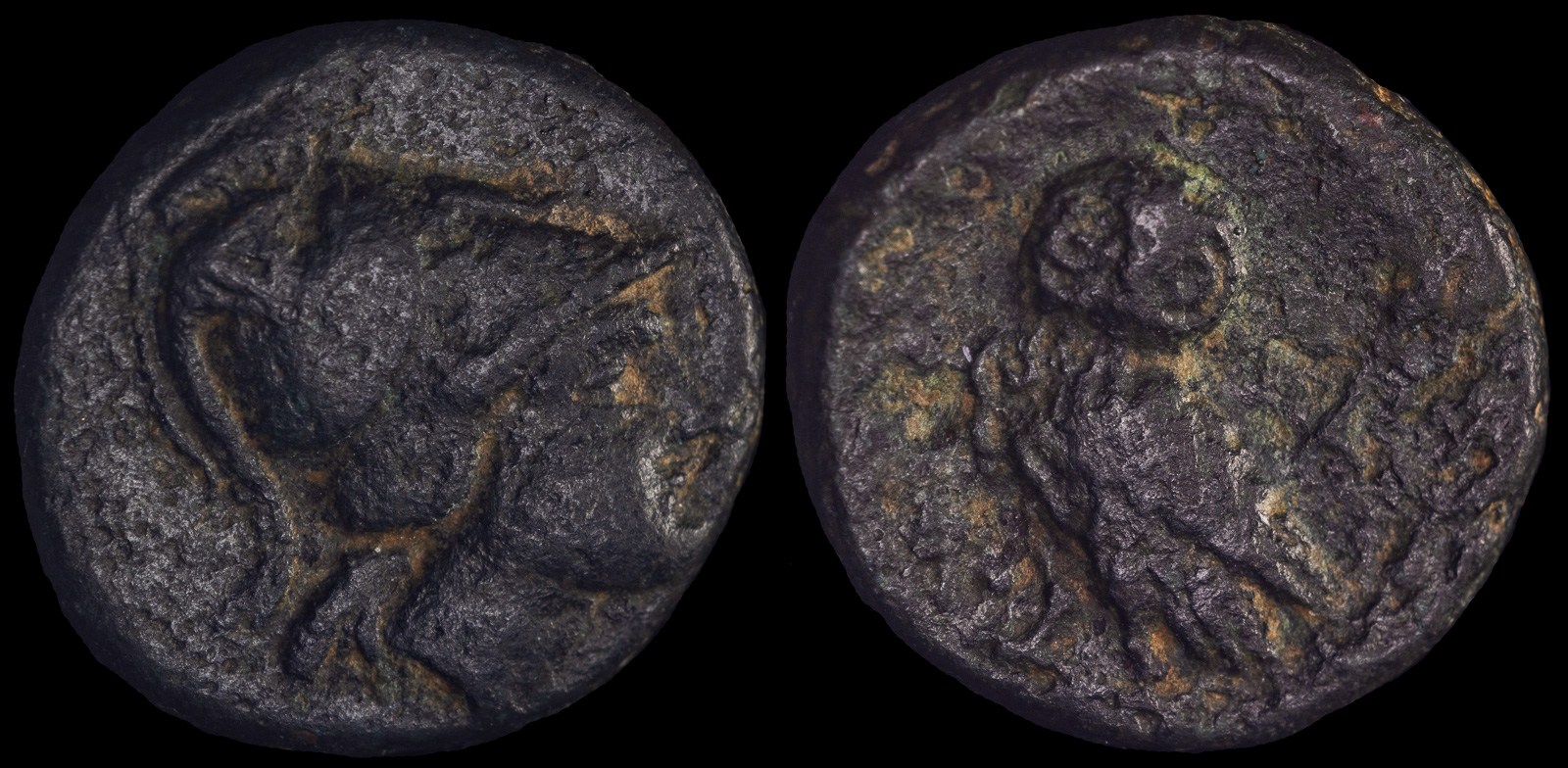
Attica, Athens
circa 340-322 BCE
Æ 14 mm, 2,19 g
Obv: Head of Athena r., wearing Attic helmet.
Rev: OE. Double-bodied owl stg. on Eleusis ring; in each upper corner, olive spray
Sv. 22.37; Kroll 43c
After his death, they revolted again in the Lamian War and would nearly have beaten Antipater were it not for some bad luck. Not long after that, they strongly backed Demetrios Poliorketes in his quest to win over the other diadochi. They even let him live in the Acropolis and held an edition of the Mysteries just for him. Over time, their opinion of him dimmed.
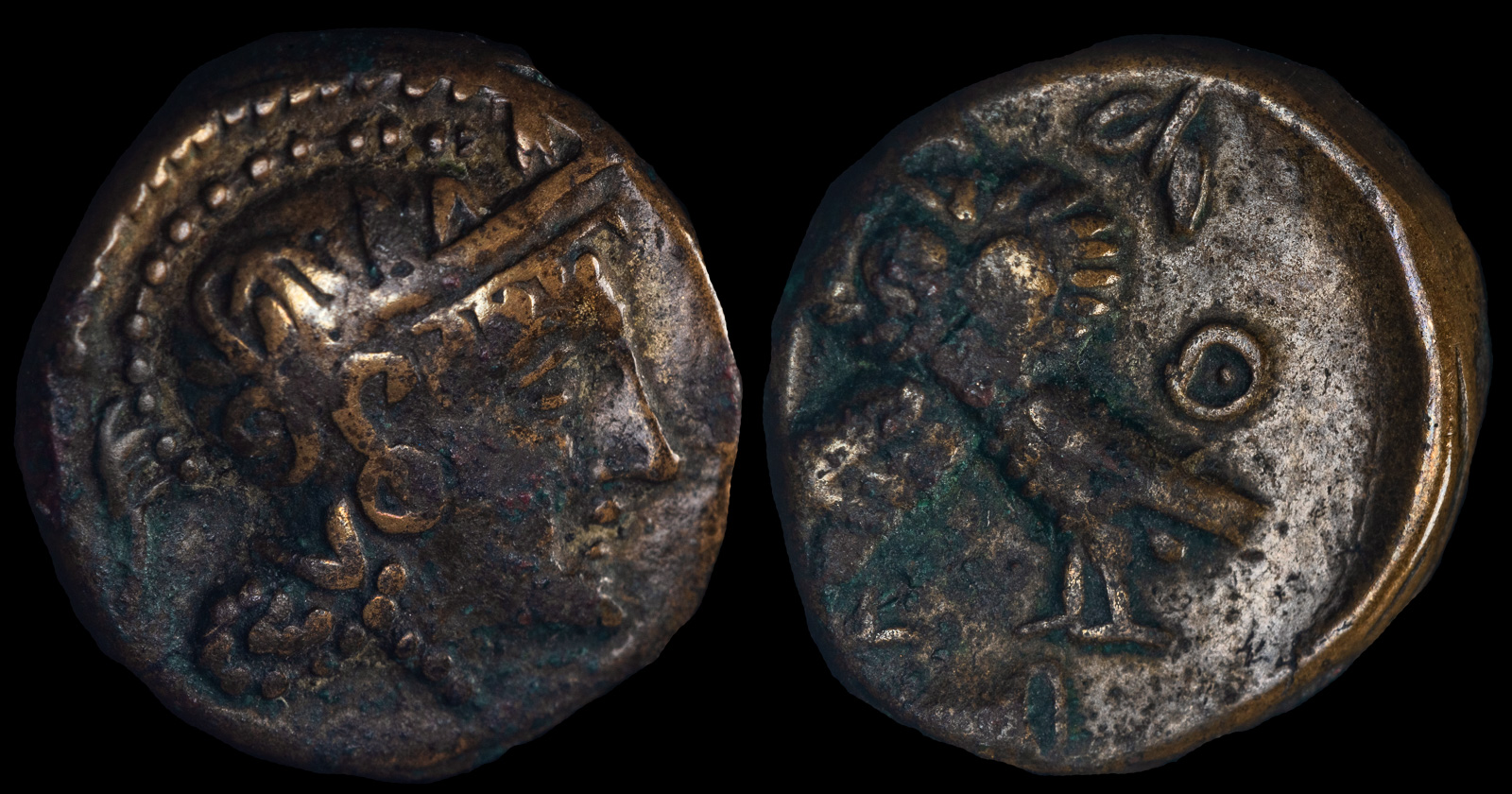
Attica, Athens
circa 307-300 BCE
Æ 15 mm, 3,91 g
Obv: Head of Athena r., wear Corinthian helmet with crests and, on visor, snake ornament
Rev: HO- Owl standing, facing; all in olive wreath.
Sv. 22.85-88; Kroll 50b
The coin below as referred to as “bird money” by Aristophanes in his play “The Birds”.
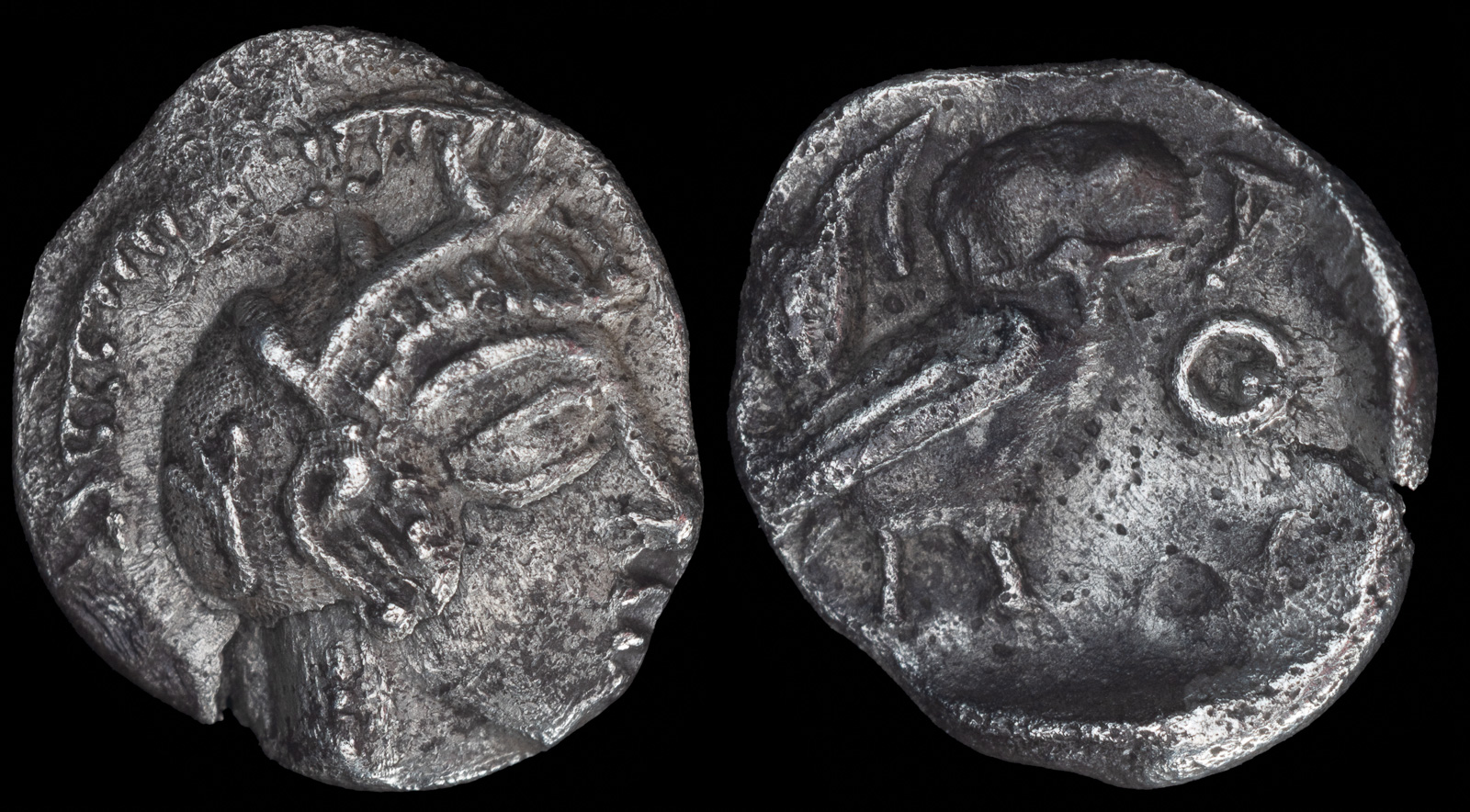
Attica, Athens
Circa 454-404 BCE
AR Hemiobol 0.35g, 8mm
Obv.: helmeted head of Athena right
Rev.: AΘE, owl standing right, head facing; olive sprig behind; all within incuse square
Kroll 14; SNG Copenhagen 59
The coin below was minted roughly during the time of Antigonos II Gonatas, when Athens again reverted to mostly a puppet of Macedon.
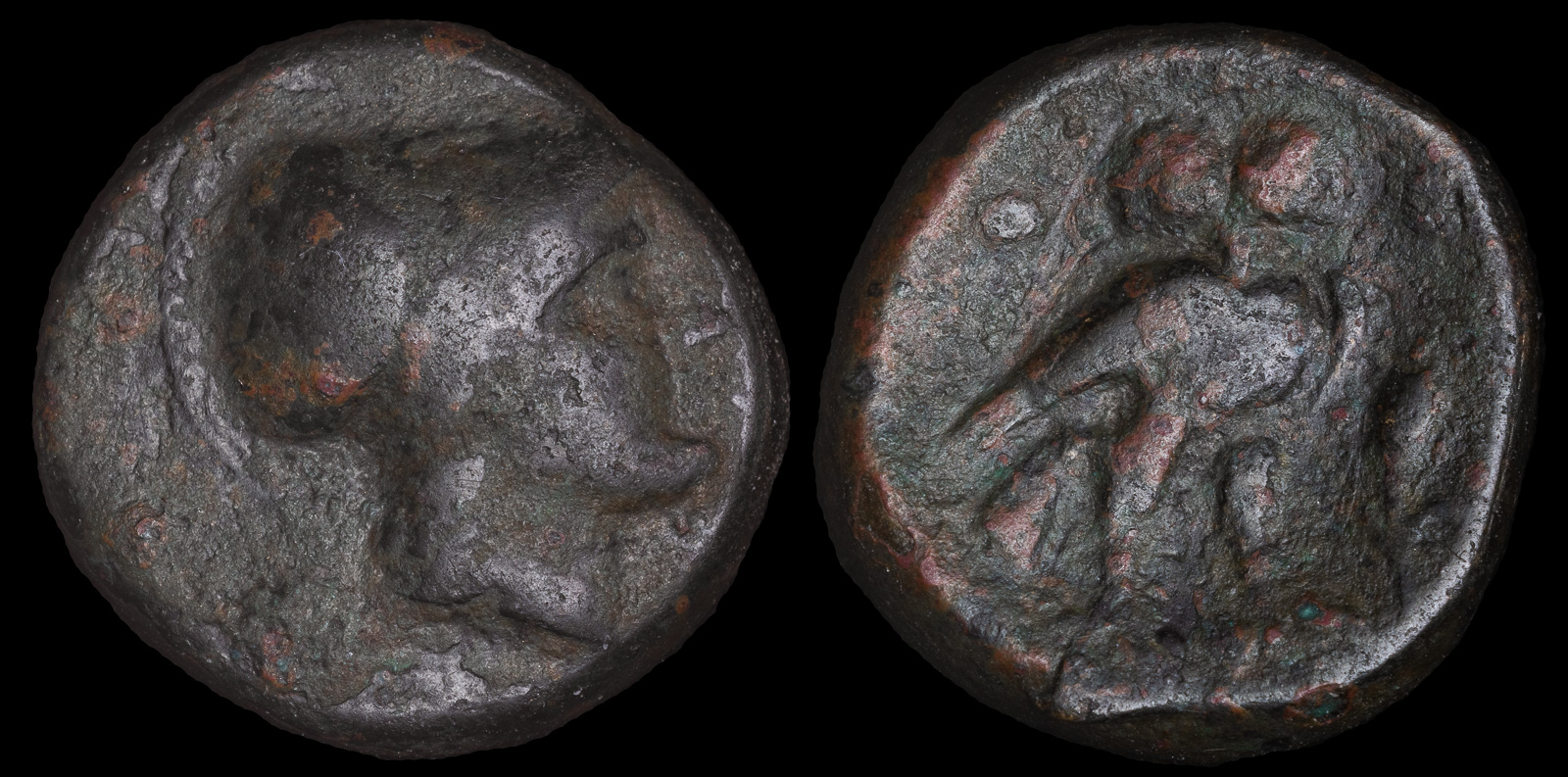
Athens Attica
ca. 270 – 261 BCE
Ae 13.5mm, 2.9gms
Obv: Helmeted head of Athena right
Rev: A – OE; Owl standing right with head facing, poppy in right field
Ref: Walker Period I, 58
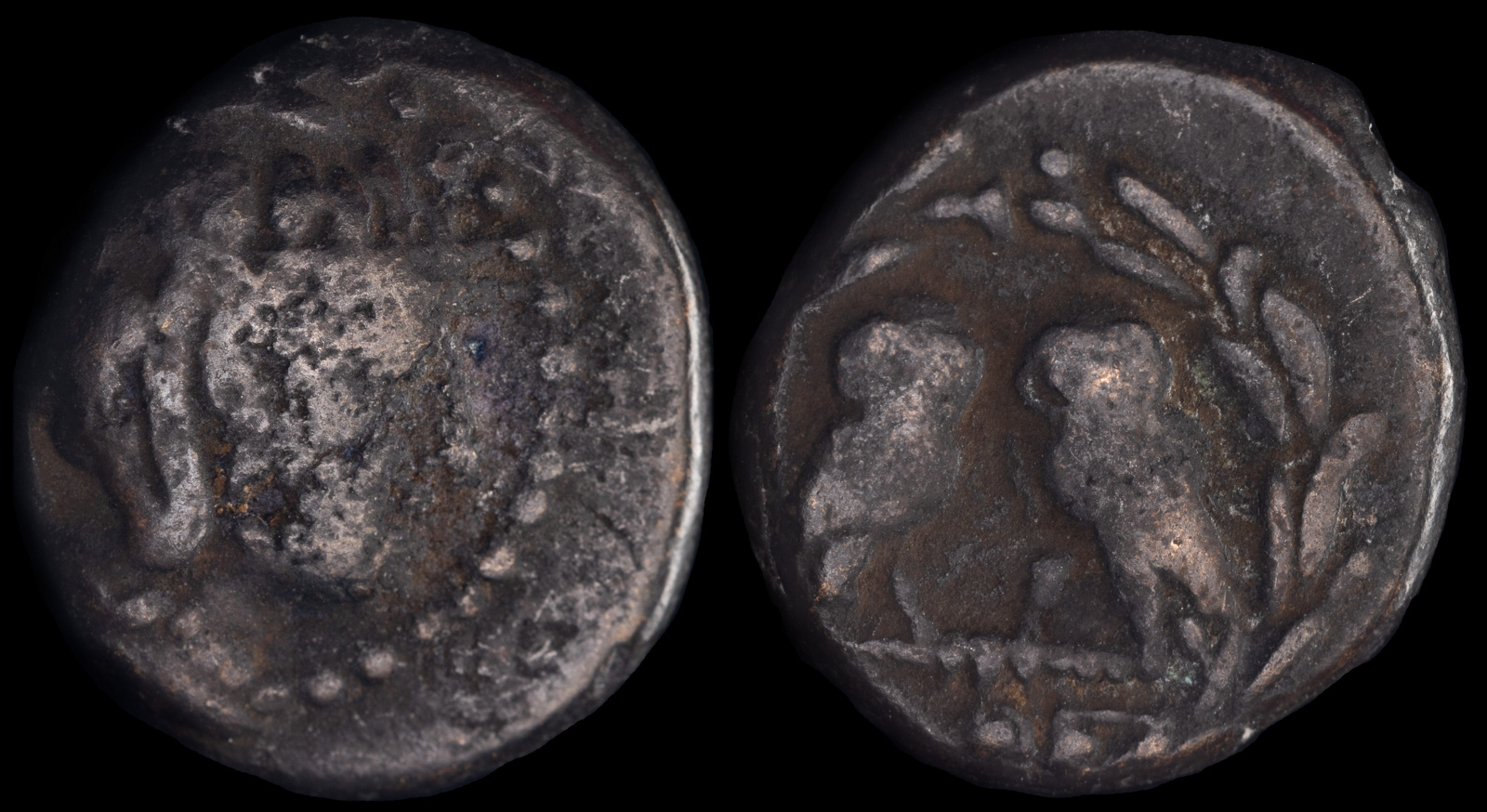
Attica, Athens
322/17-307 BCE
Ae 3.2g, 13.21mm 12h
Obv.: Helmeted head of Athena right within dotted border.
Rev.: Two owl confronted, heads facing, on thunderbolt, all within wreath. AΘΕ below.
REf.: Kroll 46, HGC 4, 1726
This coin depicts the statue of Athena Parthenos that existed within the Parthenon.
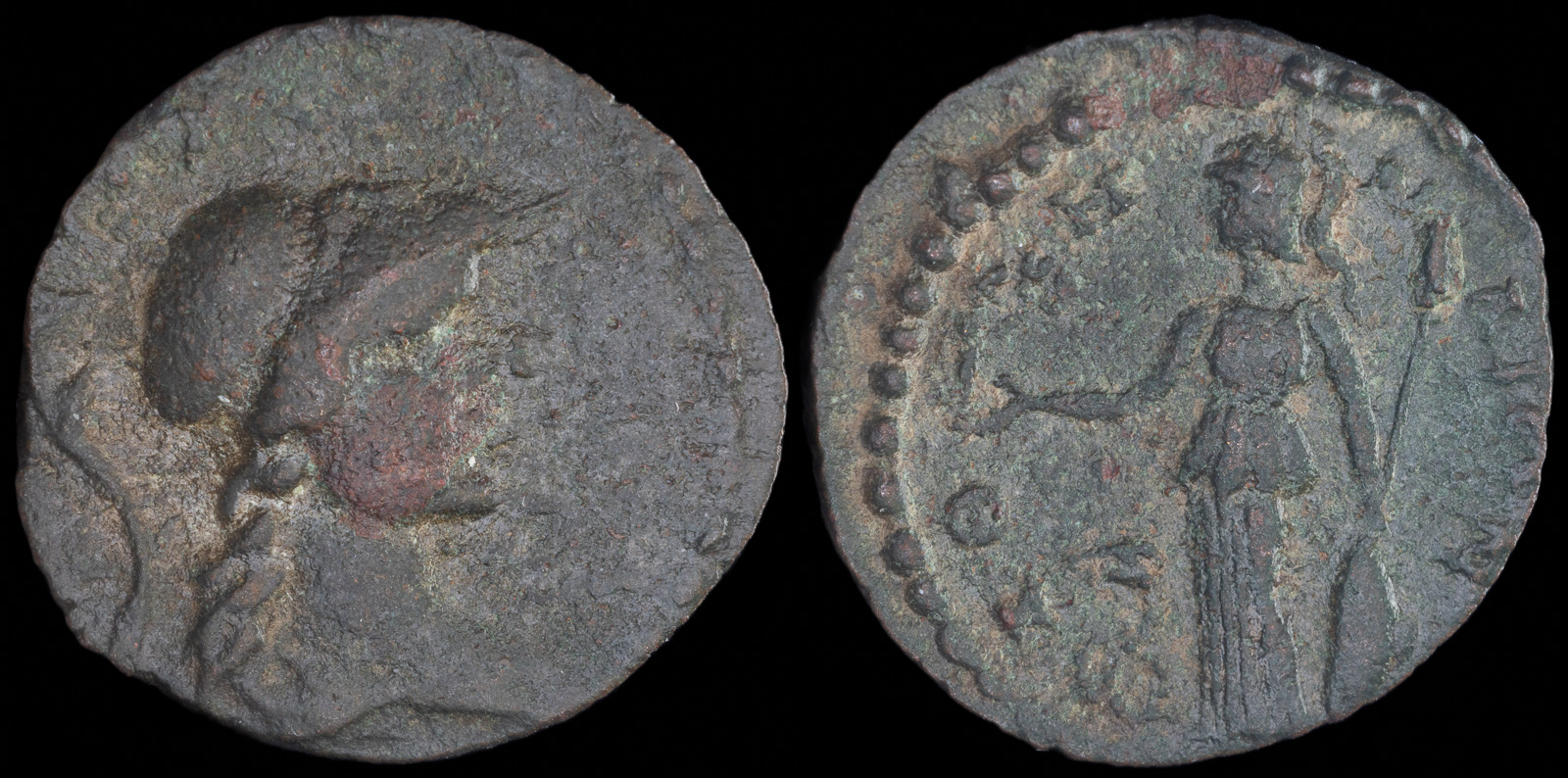
Attica, Athens
Pseudo-autonomous
Time of Gallienus 264-267 CE
Ae 21.89mm 5.14g
Obverse: Head of Athena right, wearing crested Corinthian helmet
Reverse: AΘHNAIΩN, Athena Parthenos standing left, holding Nike and resting hand on grounded shield and spear, snake left at feet
Svoronos Plate 87, 12; Imhoof-Blumer+Gardner Y, XX
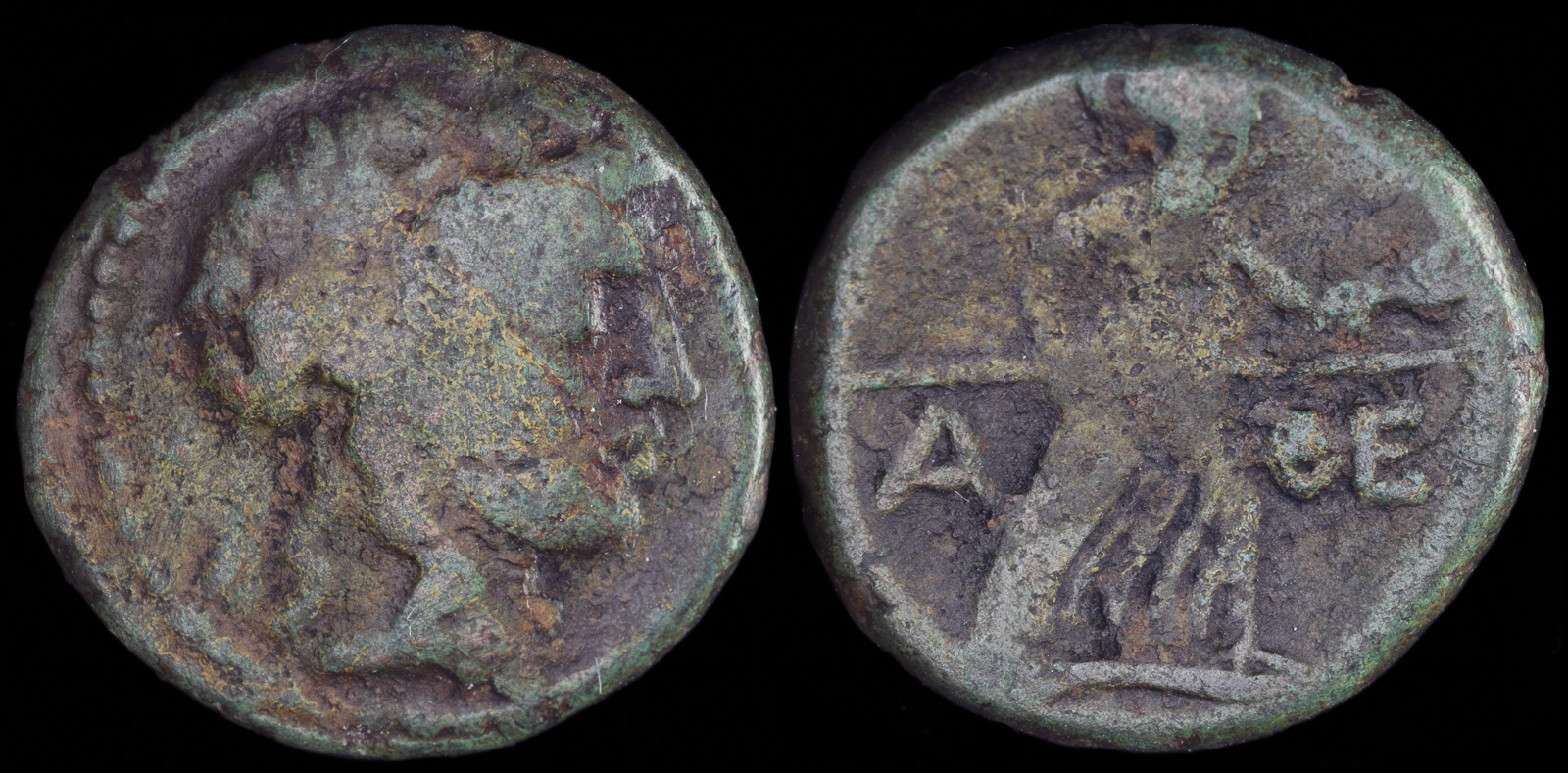
Attica, Athens
39-37 BCE
Ae 6.10g, 17mm
Head of Dionysos, wreathed in ivy, right.
Athena advancing right, holding a spear “AΘE”
Kroll 140
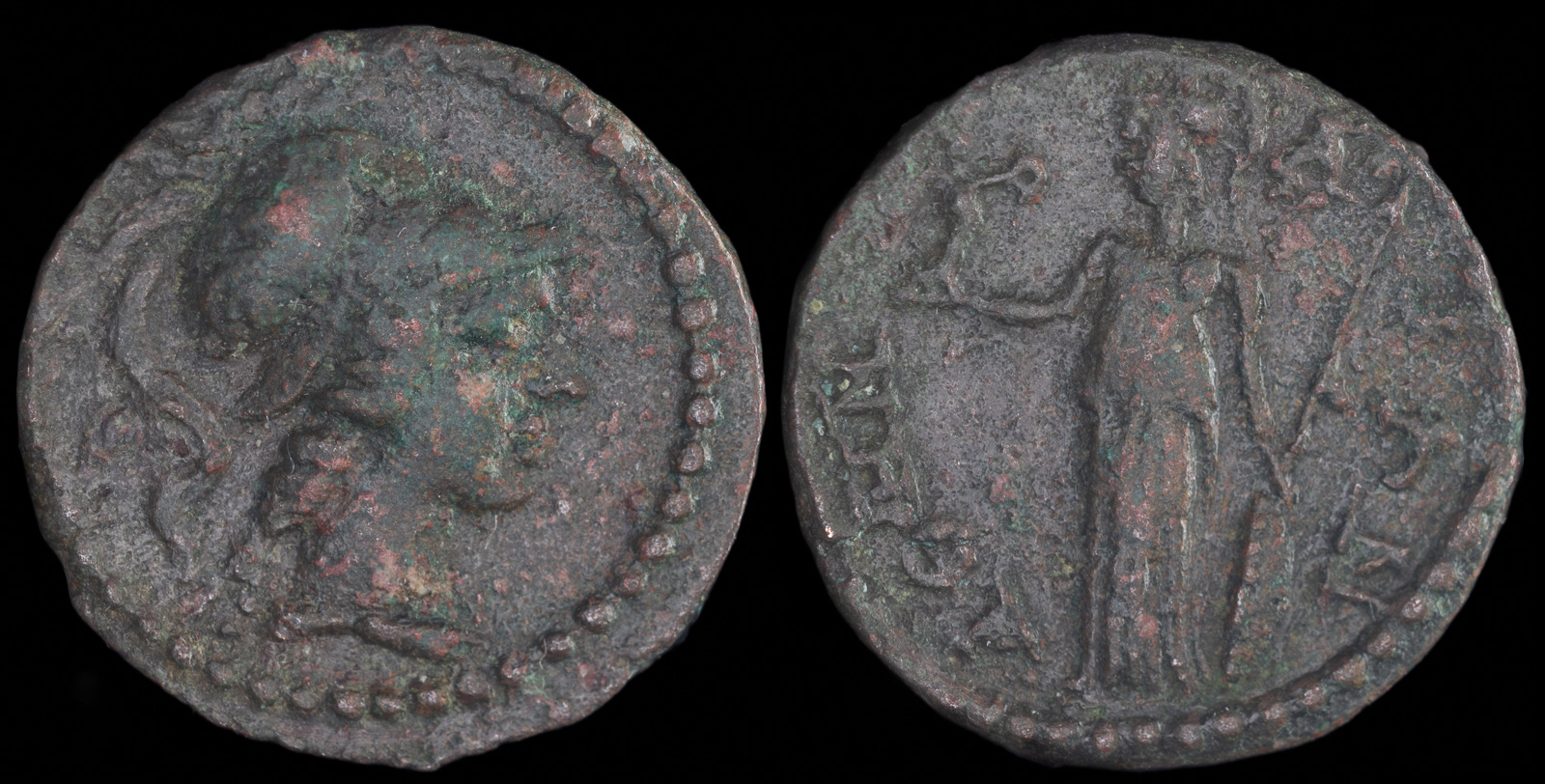
Attica, Athens
140-175 CE
AE 21mm 6.74g
Obv.: head of Athena right
Rev.: ΑΘΗΝΑΙΩΝ, Athena Parthenos standing, left, holding Nike over serpent, resting arm on shield; next to shield, upright spear
RPC IV. 1 3418; Kroll, Agora 248(2); Svoronos, Athens 82.32–3
In 2023, I had the opportunity to visit Athens. Here are some of my photos from the stay.

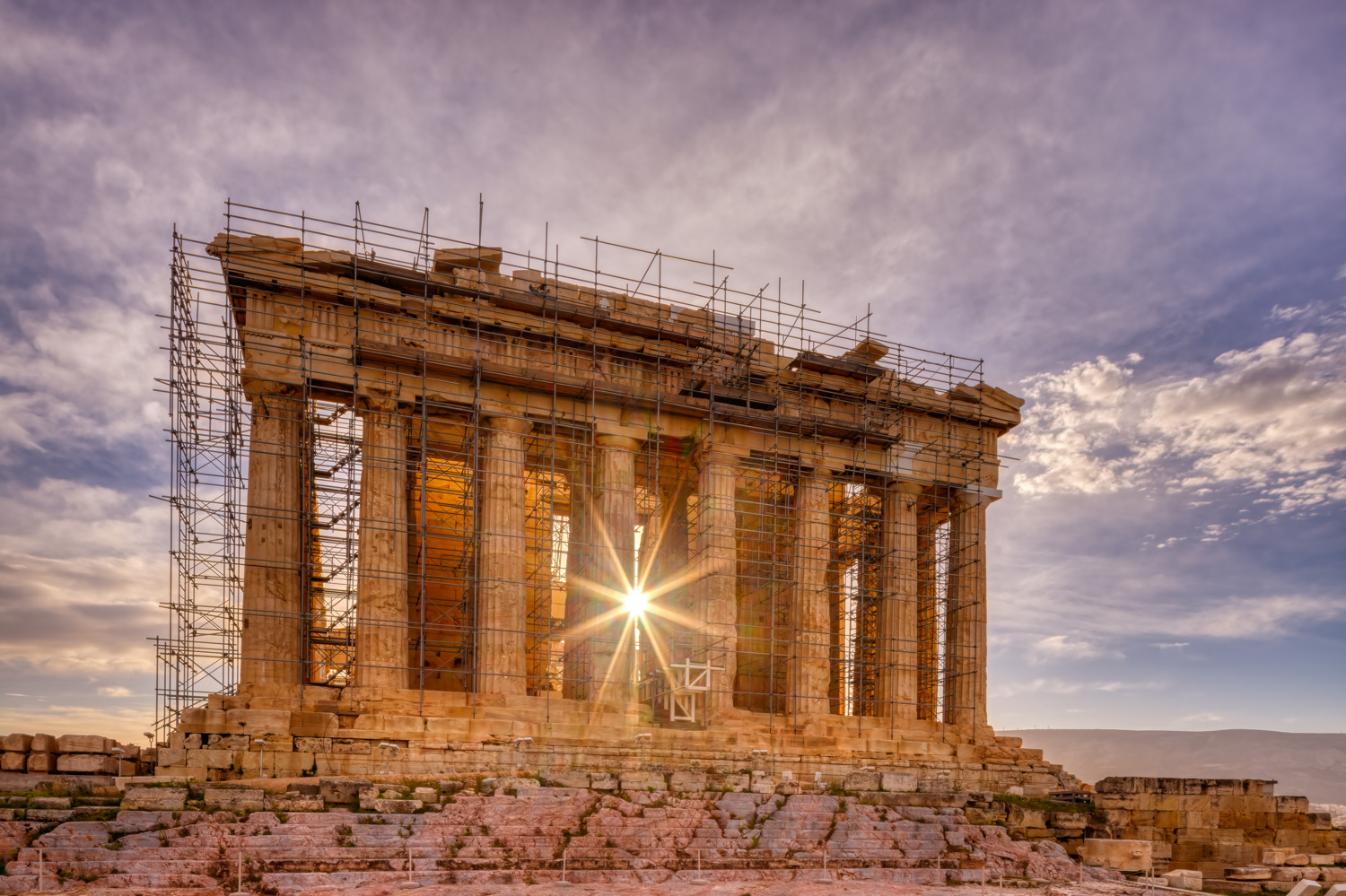
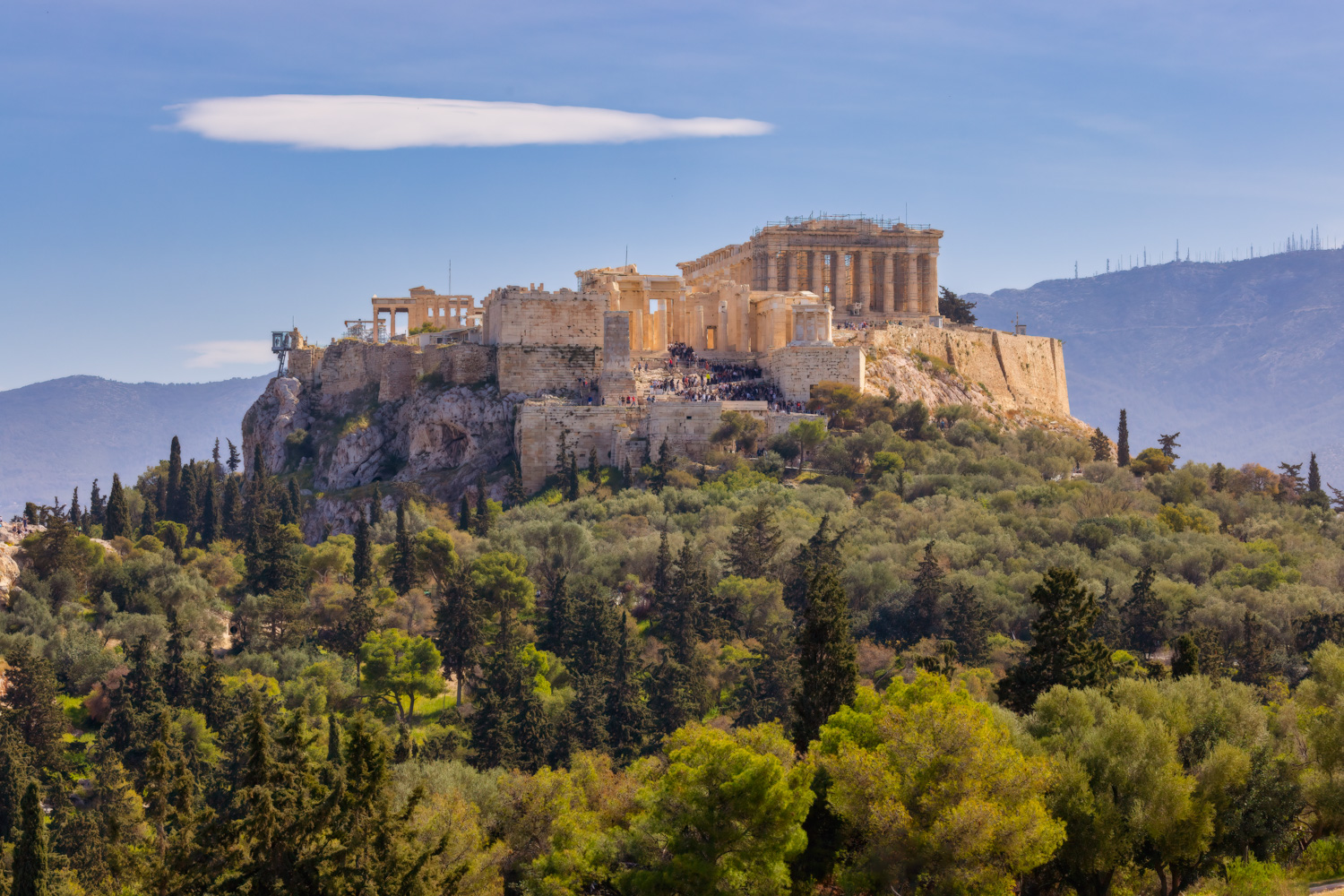
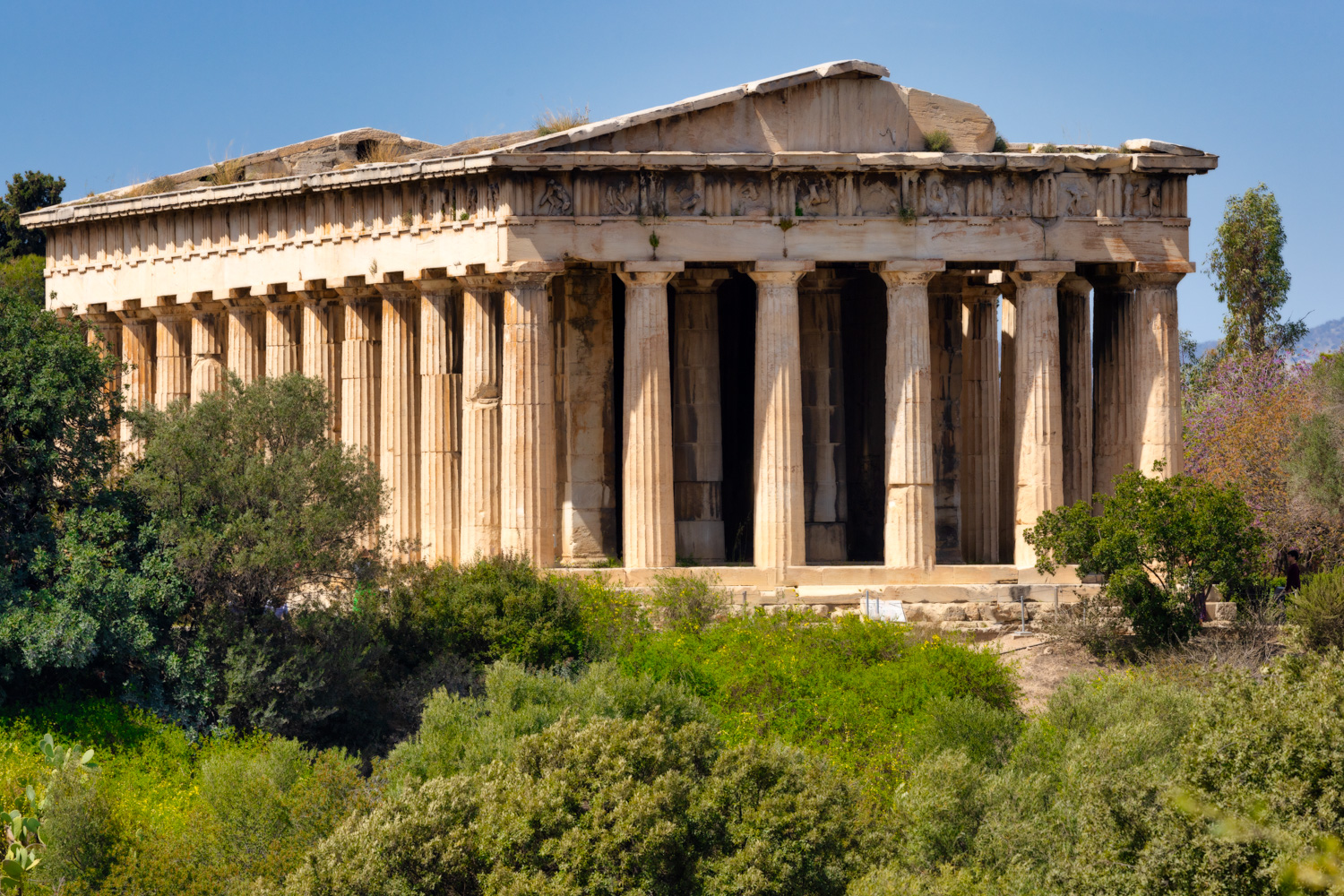
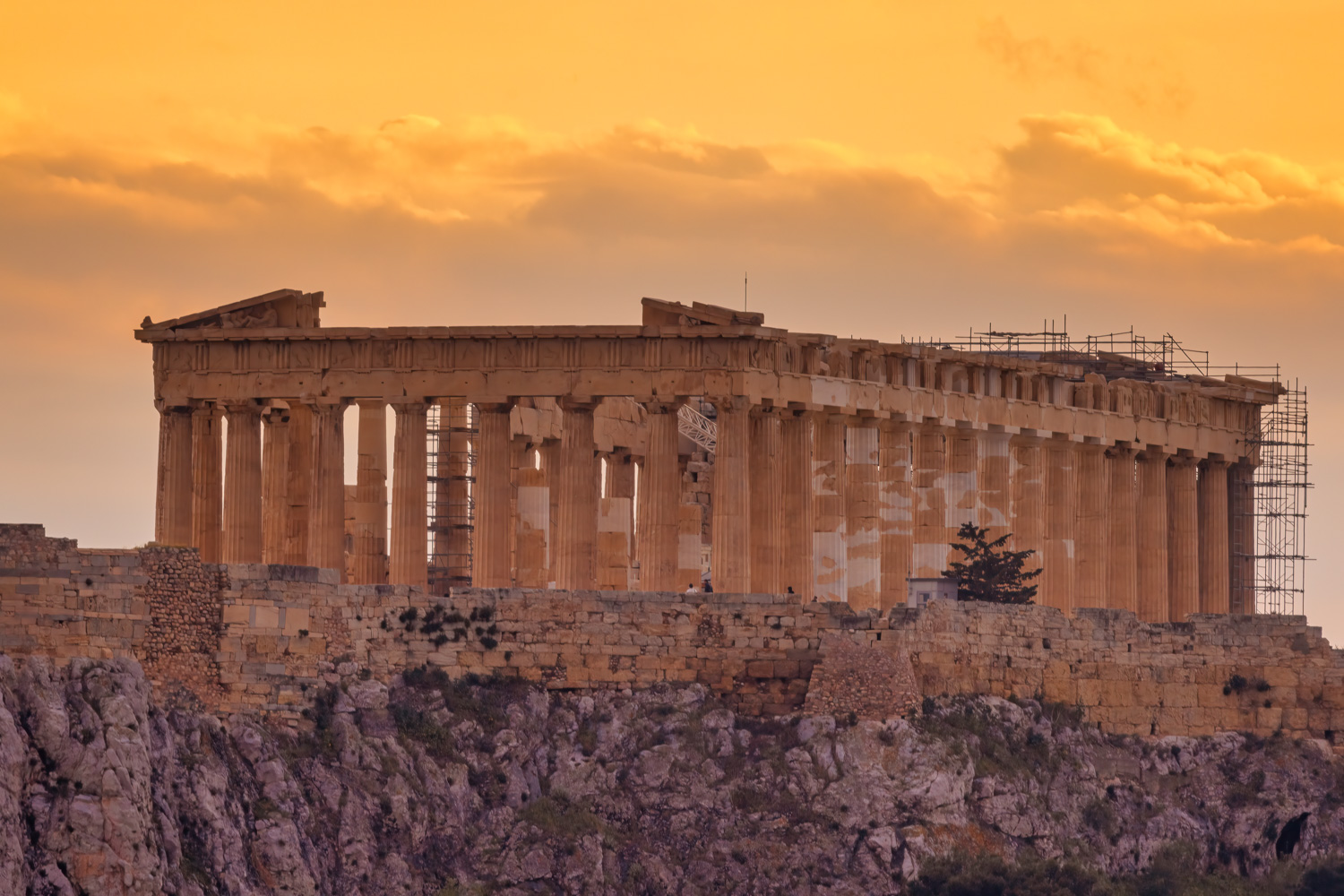
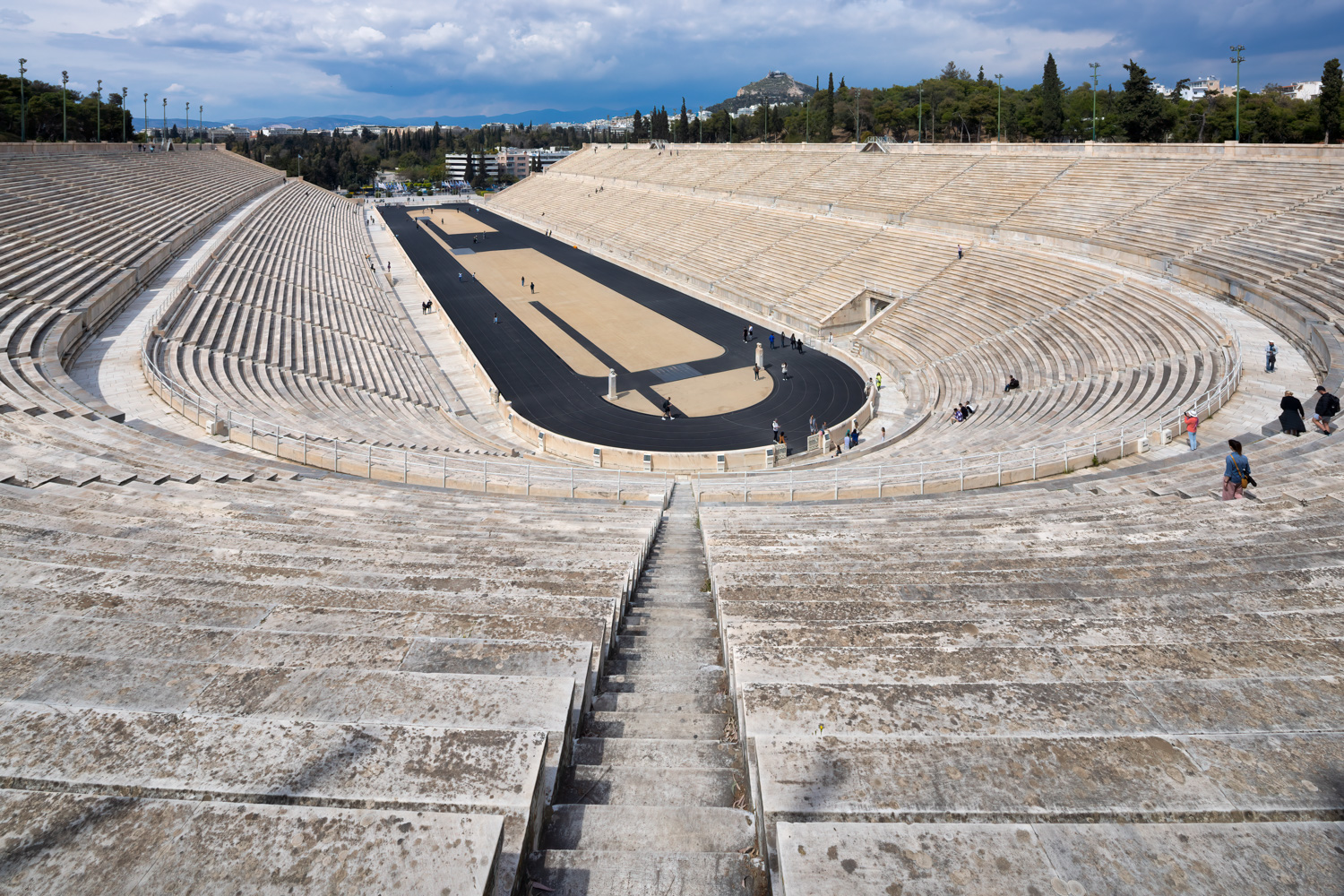

Temple of Athena Polias completed in Athens.
Approximate year when Athens sends the Olympic victor Phrynon to capture Sigeion. He duels Pittakos but is defeated when the latter uses a net.
Solon, the Athenian lawgiver, includes provisions for the protection of the Eleusinian Mysteries.
Solonian law established in Athens.
Athens has control over Sigeion.
Pesistratos becomes tyrant of Athens.
Pisistratos ousted from office in Athens when two rival factions join.
Miltiades, the son of Kimon of Athens settles with colonists in Kardia.
Pisistratos lands at Marathon and routes an Athenian force. He becomes tyrant of Athens again.
The tyrant Peisistratos of Athens enhances the sanctuary at Eleusis, commissioning extensive building projects and promoting the Mysteries as part of Athenian culture.
Approximate date of Pisistratos of Athens’ decree that all graves within sight of the temple at Delos be dug up and moved.
Death of the tyrant Pisistratos, tyrant of Athens.
Iolkos given by the Thessalians to Hippias, recently expulsed from Athens, but he rejects it.
Hippias, the son of Pesistratos, is banished from Athens and spends time ruling Sigeion.
Chalkis is defeated by Athens in the Battle of Chalkis. As a result, Athens takes control of much of Euboea’s land and imposes a tribute on the city.
Aristagoras of Miletos asks Athens for help in the Ionian Revolt.
Athens, Eretria, and the Ionian cities are defeated by the Persians at the Battle of Ephesos.
As punishment for their support of the Persians, Athens besieges Paros after a heavy fine is rejected. After 26 days, the Athenians are forced to depart.
479 BCE
Thorax of Larissa helps Xerxes in his march towards Athens.
August 7
Lampsakos joins the Delian League and is assessed 12 talents by Athens.
Sestos is besieged by Athens under Xanthippus. They surrender due to starvation.
August 27
Rhodes is liberated from Persia by soldiers from Athens.
Athens forcefully establishes a Cleruchy on Andros as punishment for their support of Xerxes.
The Athenian Themistokles is given control over Magnesia ad Maeander.
Athenians create a colony in Eion, just south of Amphipolis.
Athens attacks and takes over Karystos as punishment for their support of Xerxes.
Approximate time when Sestos is retaken by Kimon of Athens.
The Persians is performed by Aeschylus in Athens. Its setting is Susa.
Naxos attempts to leave the Delian League and are severely punished by Athens.
Athens under Kimon attacks Phaselis and places it in the Delian League.
The Athenian colony near Amphipolis is annihilated by the Thracians, with ten thousand colonists killed.
Athens, aligned with Sparta, sends a force of 4000 soldiers to help squash a helot uprising. Upon arriving in Sparta, they are dismissed while other allies remain. Angered, Athens repudiates their treaty with Sparta.
Thasos rebels against Athenian rule and is besieged.
Thasos is finally taken by Athens and are forced to tear down their walls.
Argos joins an alliance with Athens and Thessaly.
459 BCE
Athens lays siege to Aegina as part of the Peloponnesian War.
Kelenderis becomes the eastern-most member of the Delian League, headed by Athens.
Aegina is defeated by Athens, forced to join the Delian League, and pay tribute. Athens dismantles Aegina’s naval fleet, reducing its power and independence significantly.
Aegina is defeated by Athens, forced to join the Delian League, and pay tribute. Athens dismantles Aegina’s naval fleet, reducing its power and independence significantly.
Sparta defeats Athens, with 1000 hoplites from Argos, in the Battle of Tanagra. Casualties are heavy on both sides.
Sparta defeats Athens in the Battle of Tanagra.
Athens under Tolmides lands at Sikyon and defeats them.
Athens destroys the walls of Tanagra.
The Athenians under Myronides unsuccessfully besiege Pharsalos.
First mention of Airai in tribute records to Athens.
The shared treasury of the Delian League is transferred from Delos to Athens.
Kyrene gives refuge to Athenian soldiers who had been defeated by the Persians in Egypt.
Sikyon is again defeated by Athens, this time under Perikles, though the city is not taken due to help from Sparta.
Erythrai secedes from the Delian League before Athens installs a garrison and they rejoin.
The alliance of Athens, Argos, and Thessaly dissolves.
Peace of Kallias, an agreement between Athens and Persia after a series of conflicts between them. In Cyprus, Amathos, Kelenderis, and Salamis remain under Persian control but maintains its local autonomy. Ephesos, Miletos, Priene, Klazomenai, and Phokaia also obtain some autonomy.
Athens founds a colony on Imbros.
Athens establishes a fleet at Tenedos.
Kimon of Athens frees Marion from the Persians.
Construction of the Parthenon in Athens begins.
The Thirty Years’ Peace is signed between Athens and Sparta where they recognize each others rights to direct their own alliances.
Athens makes Nymphaion its military base in the region.
Thourion founded by settlers from Athens and exiles from Sybaris.
Samos revolts from Athens. Sparta considers war in their support, but the matter is put to a vote and Corinth disagrees. Peace between Sparta and Athens continues and Athens squashes the revolt.
The famed Athenian playwright Sophocles is named general against the Anaians.
Construction of the Athena Parthenos in Athens is completed.
Athenians found a new colony at Amphipolis under the general Hagnon.
Athens imposes trade sanctions on citizens of Megara, which angers the Spartans and is one of the causes of the Peloponnesian War.
Anaxagoras retires to Lampsakos after a trial in Athens.
The Athenian general Phormio makes his base at Aphytis and leads his army against Pallene. He also takes Argos Amphilochian, removes the Ambrakians, and restores the town to the original inhabitants.
Decorations completed on the Parthenon in Athens.
Spartans vote that Athens has violated the Thirty Years’ Peace and declares war. The Peloponnesian War begins.
Athens unsuccessfully besieges Pydna.
Pericles gives his famous funeral oration in Athens.
Leukas sides with Sparta over Athens in the Peloponnesian War.
Thebes attempts to reduce Plataea but are prevented by Athens.
429 BCE
The Plague kills 30,000 people in Athens, including Pericles and his sons.
Athenians restore Kynes, son of Thelytos, to the throne in Koronta.
Athens detaches Kolone , Ophrynion, and Larissa Ptolemais from Mytilene in punishment for their revolt.
Athens attempts to invade Aetolia, but is forced back by the Aetolian League.
Ambrakia is crushed by Athens in the Battle of Idomene in an attempt to re-take Argos Amphilochian.
Athens decrees that it is illegal to be born or die on Delos.
Medeion is crossed by the Spartan army on its march to the Battle of Olpai, where Athens defeated them.
Athens attacks the countryside of Melos.
The Battle of Sphacteria between Athens and Sparta is fought at the entrance to the Bay of Pylos, resulting in an Athenian victory. Ainos, Imbros, and the cities of Lemnos (Myrina, Hephaistia) provide support.
Anaktorion is captured by the Acarnanians and Athenians during the Peloponnesian War. The Acarnanians expel the Corinthians from the city, and Anaktorion becomes part of the Acarnanian League.
Athens defeats Sparta at the Battle of Pylos and traps 420 Spartans.
Athens demands that Melos pay tribute, but they refuse.
Cleon of Athens sends an expedition to Pylos to fortify a rocky promontory there.
The Spartan general Brasidas convinces Akanthos to leave the Athenian Alliance.
Temple of Athena Nike is built in Athens.
Athens under Demosthenes invade Sikyon, but are repelled by them.
The Athenian general Kleon recaptures Galepsos.
Mende attempts to revolt against Athenian rule, but is repressed.
Skione revolts against Athens and is besieged by them.
The Athenian general Kleon attempts to take Amphipolis, but fails in the attempt. Both Kleon and the Spartan general Brasidas perish.
The Peace of Nikias between Athens and Sparta is signed after the deaths of Cleon and Brasidas. They agree to break up the Chalkidian League, but this is not done.
Athens settles Spartan helot deserters and Messenians from Pylos at Kranion.
Athens transports the Spartan helots and Messenians previously moved to Kranion back to Pylos to annoy Sparta.
Sparta deposits hostages at Orchomenos, but when the army of Athens approaches, they are quickly given up.
Athens surrounds Melos and demands they ally with them. When the Melians reject, all adult males are slaughtered and the women and children are sold into slavery.
Kentoripai surrenders to the Athenians.
Metapontion provides a small support force to Athens against Syracuse.
The Athenian general Demosthenes takes aboard heavy infantry from Zakynthos and Kephallenia (likely including Same) and crosses over to the opposite coast of Akarnania to Alyzeia and Anaktorion, already held by Athens.
The Athenian forces in Sicily are destroyed by Syracuse.
A group of Thracians, whom Athens were sending home, landed at Mykalessos and slaughtered everyone, including women and children.
Athens regains control over Thourion.
Under Darius I’s orders, Tissaphernes allies with Sparta over Athens and re-occupies most of the Ionian coast.
Chios, Kalchedon, Erythrai, and Klazomenai revolt against Athens and is besieged until relieved by Sparta.
Andros proclaims its freedom from Athens.
Sparta defeats the Athenian fleet based in Samos.
Sparta takes Byzantion in an effort to force Athens into submission.
An Athenian fleet under Thrasybulus barely defeats a Spartan fleet at the Battle of Kynossema. Three days afterward, several boats from Harpagion are captured.
Samos serves as a temporary home for the Athenian democracy.
An Athenian fleet under Alkibiades, Thrasybulos, and Theramenes defeats the Spartans at the Battle of Kyzikos. Afterwards, Sparta offers peace but is rejected.
Kos is sacked again, this time by Athenians under Alkibiades, who then fortifies the city.
Athens under Theramenes remove the oligarchy in Paros and replace it with a democracy.
Prokonnesos is conquered for Athens by Alkibiades.
King Archelaos of Macedonia besieges Pydna from land, while Athens besieges it from sea. The location of the city is then moved by Archelaos, but the citizens later move it back.
408 BCE
Abydos attacked by Athens but repelled by Pharnabazos.
Abdera subjugated under Athens by their general Thrasybulus.
Athens attempts to force Andros back into its orbit, but fails.
Thasos expels its Spartan contingent and admits Athens under Thrasyboulos.
Athens under Alkibiades and Sparta under Lysander face off in the Battle of Notion. Sparta loses more ships, but Athens faces heavy losses when many are not rescued at sea. The resulting trial strips Alkibiades and the other Athenian generals of command.
Lysander destroys the Athenian fleet at the mouth of the Aigiospotamoi. Just before, the Athenian triremes arrive at Elaios to discover that Lysander is in control of Lampsakos.
Sparta expels the Athenian colonists on Melos and returns the survivors of the siege.
Peloponnesian War ends in an Athenian surrender, and as a result Adramytteion is ruled by Mytilene. Residents of Aegina are allowed to return to their island.
Delos regains control over their sanctuary and island following Athens’ defeat in the Peloponnesian War.
The Athenian exile Alkibiades is executed at his house in Persia, possibly at the order of Pharnabazos.
Hamaxitos gains some freedom after Athens is defeated in the Peloponnesian War.
The Spartans under Agesilaos II attack and Persia. Artaxerxes II retaliates by bribing Corinth, Thebes, and Athens to make war on Sparta.
The Athamanians leave Sparta and join an Athenian alliance.
Athens begins administering the sanctuary at Delos again.
The Spartan admiral Peisander is defeated and killed by a fleet headed by Pharnabazos and former Athenian admiral Konon at the Battle of Knidos.
July
Sparta and their allies, including Sikyon and Tegea, defeat Athens and their allies at the Battle of Nemea. On Athens side are Thebes, Lokris Opuntii, and Corinth. With Sparta are Halieis, Sikyon, Epidauros, Troizen, and Hermione. Phlious remains neutral. Pellene fights on the side of Sparta against Thespiai.
Pharnabazos travels to Corinth and provides them with funds to rebuild their fleet, then he provides Athens the funds to rebuild their long walls.
Iphikrates of Athens defeats Phlious.
Sestos is occupied by Athenian soldiers under Konon.
Tiribazos provides funds to rebuild the Spartan fleet to contend with Athens.
The Athenian general Thrasybulos threatens Aspendos. The inhabitants collect money to bribe him to leave, but he still orders his trips to trample their crops. Enraged, the Aspendians stab and kill him.
Pharaoh Hakor negotiates a treaty with Athens.
Amyntas III adopts the Athenian general Iphikrates, who has marriage ties to Kotys I.
The Academy in Athens is founded by Plato.
Eresos, Byzantion, Chios,Mytilene, Methymna, Rhodes, Thebes, Korkyra, Eretria, Kios, Samos, Naxos, Andros, Myrina (Lembos), Hephaistia, Imbros, and Thasos join the Second Athenian League, reaffirming its alliance with Athens in response to the growing threat of Persian interference and internal Greek conflicts.
Naval battle is fought near Alyzeia between Athenians under Timotheos and Spartans under Nikolochos.
The Chalkidian League leave Sparta and join and alliance with Athens, but that soon falls out over ownership of Amphipolis.
Stratos joins the second Athenian Empire.
Iphikrates of Athens invades Thyrrheion.
Amyntas III supports Athens’ claim over Amphipolis.
Persia under Artaxerxes II provides funds to Sparta to continue the Spartan-Theban war. They probably also provide funds to Athens.
Eudoxos assumes the head of the Academy at Athens while Plato is in Syracuse.
Autophradates lay siege to Ariobarzanes in Assos. In exchange for Athenian support, Ariobarzanes gifts them Sestos.
Samos is taken by Athens after a siege of eleven months.
Potidaia is taken by Athens.
With Theban power down after the death of Epaminondas, Alexander of Pherai takes Tinos and sells the inhabitants as slaves, then besieges Peparethos. Athens defeats Alexander near Sounion and relieves Peparethos. Alexander then plunders Piraios.
Philip II defeats a force of 3000 Athenian hoplites promoting a pretender Argaios II.
355 BCE
Kersebleptes, in a bid against Philip II, turns over all the cities of the Chersonese to Athens except for Kardia.
Philip II takes Pydna. He is supposed to give up Amphipolis to Athens in exchange, but ends up keeping both cities.
Chares given joint command of the Athenian forces. They choose not to engage with the enemy, and Chares and Aristophon prosecute their colleague Iphicrates for the event. He is acquitted.
Ketriporis enters an alliance with Athens, the Illyrians, and the Paeonians (probably under Lykkeios) against Philip II.
Chares takes up service with the breakaway satrap Artabazos. Artaxerxes III Okhos pressures Athens, and Chares is forced to leave. Artabazos then hires Thebans.
Demetrios of Phaleron is born in Phaleron, a port of Athens.
When Philip II marches against Kersebleptes, Athenian troops under Chares are sent against Macedonia. However, they soon disappear and Athens has no idea what happened to them.
The major cities in Cyprus – Salamis under Pnytagoras, Kourion, Paphos, and Soloi – rebel against Artaxerxes III Okhos. He sends Idreios along with the Athenian Phokion to quell the rebellion.
The Aetolian League, Athens, and Thebes revolt against Macedon after the death of Philip II.
The Lyceum is founded in Athens by Aristotle.
Aristotle returns to Athens from Mytilene.
326 BCE
Antipater barricaded in Herakleia Trachineia by Athens during the Lamian War.
Antipater and Krateros defeat Athens and the Aetolian League at the Battle of Krannon.
Kleitos the White defeats the Athenian fleet near Amorgos.
Athens and the Aetolian League leave their baggage at Melitaia before attacking Leonnatos.
Kassander appoints Demetrios of Phaleron to administer Athens.
Antigonos I Monophthalmos Declaration of Tyre grants autonomy to all Greek cities. While its effects weren’t the same everywhere, it allowed Delos to regain control of its Temple to Apollo from Athens.
Antigonos Monophthalmos gives Athens grain and timber and removes his garrison from Imbros, giving the island back to Athens.
Demetrios Poliorketes takes Athens from Kassander and forces Demetrios of Phaleron to flee to Thebes.
Marriage of Demetrios Poliorketes to Eurydike, an Athenian noblewoman and the widow of Ophellas of Kyrene.
Demetrios Poliorketes pushes Kassander out of Athens and chases him to Herakleia Trachineia, who submit to him.
Demetrios Poliorketes re-establishes the Corinthian League while at Athens.
Pleistarchos, Eupolemos and Kassander are defeated at the Diplyon Gate – the only double gate for Athens – by the Athenians while trying to re-install Demetrios of Phaleron.
Athens and Sikyon form an alliance, the nature of which is not known.
Demetrios Poliorketes besieges Athens, which comes under the tyranny of Lachares.
Demetrios Poliorketes takes control of Athens and pardons its citizens for their resistance to him.
Demetrios Poliorketes besieges Athens but is unsuccessful.
April
Athens receives 7,500 medimnoi of wheat from Paeonia under Audoleon.
Athens is convinced by Chremonides to join Sparta in declaring war on Antigonos II.
Antigonos II blockades Athens and destroys a temple to Poseidon between it and Megara. Ptolemy II sends a fleet to break the blockade.
Athens and Sparta make peace with Antigonos II, who maintains his hold on Greece.
Aratos restores Salamis to Athens.
197 BCE
The Roman Senate gives Delos to Athens.
Athens is sacked by the Romans.
Peparethos is gifted by Marc Antony to Athens.
Hadrian briefly serves as ruler of Athens and is granted Athenian citizenship.
October
Hadrian visits Athens again.
March
Hadrian devotes considerable resources to complete the Temple of Olympian Zeus, under construction for centuries in Athens.
December
Hadrian spends the winter in Athens amd dedicates the Temple of Olympian Zeus.
Julian II sent to study in Athens.
March 31
The author of this page visits Athens for the first time.
April 7
The author of this page returns to Athens to pick up his wife.
April 18
The author of this page and his wife return to Athens and enjoy one last sunset before leaving Greece.